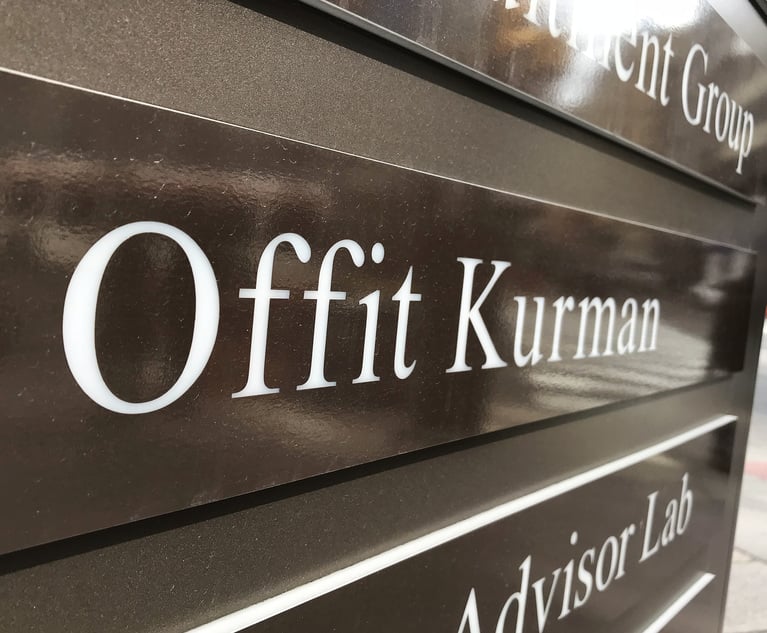 Jeffrey Cohen of Flaster Greenberg. Courtesy photo
Jeffrey Cohen of Flaster Greenberg. Courtesy photo Antitrust Blitz: NFL's Sunday Ticket Ruling Could Have Broad Implication for All Pro Sports
On June 27, a jury in the U.S. District Court for the Central District of California rendered a multibillion-dollar verdict in favor of restaurant/bar owners and individual customers and against the National Football League, related to the NFL's Sunday Ticket.
July 09, 2024 at 11:05 AM
7 minute read
On June 27, a jury in the U.S. District Court for the Central District of California rendered a multibillion-dollar verdict in favor of restaurant/bar owners and individual customers and against the National Football League (NFL), related to the NFL's Sunday Ticket. Sunday Ticket is a product offered by the NFL, beginning in 1994 and distributed exclusively through its broadcast partner DirectTV, wherein a bundle of games are offered nationwide, targeted to out-of-market fans interested in watching games of their home teams and to restaurants/bars seeking to offer this option to local fans. As pleaded by the plaintiffs in this lawsuit, the package of games "could be sold nationwide, allowing the NFL and its teams to offer a single, monopolized product containing the various products they would otherwise sell individually."
Before we get to what the NFL Sunday Ticket decision means if it withstands the plethora of post-trial motions and appeals that are anticipated to follow, let's look at how the NFL got here. Professional sports leagues have been under scrutiny for their actions under Sections 1 and 2 of the Sherman Antitrust Act for well over a century. The first major sport to tackle this issue was baseball, with the U.S. Supreme Court unanimously ruling that Major League Baseball (MLB) was exempt from the Sherman Act more than a century ago. Interestingly, when it comes to baseball, affectionately and historically referred to as "America's pastime," the court reasoned that there was no interstate commerce and thus no violation of the Sherman Act despite the court acknowledging in the same decision that:
This content has been archived. It is available through our partners, LexisNexis® and Bloomberg Law.
To view this content, please continue to their sites.
Not a Lexis Subscriber?
Subscribe Now
Not a Bloomberg Law Subscriber?
Subscribe Now
NOT FOR REPRINT
© 2025 ALM Global, LLC, All Rights Reserved. Request academic re-use from www.copyright.com. All other uses, submit a request to [email protected]. For more information visit Asset & Logo Licensing.
You Might Like
View All
Faegre Drinker Picks Arizona for Next-Gen Design Lab

Transfer of State-Law Claims From Federal to State Court in Pa.: Avoiding the Default Trap of 42 Pa. C.S. Section 5103
12 minute read
Offit Kurman Hit With $4M Legal Mal Judgment Over Client's Multimillion-Dollar Loss
3 minute read
Competitor Financed Litigation, Abused Discovery to Steal Trade Secrets, Lawsuit Filed by Sidley Austin Alleges
Trending Stories
- 1Lawyers: Meet Your New Partner
- 2What Will It Mean in California if New Federal Anti-SLAPP Legislation Passes?
- 3Longtime AOC Director Glenn Grant to Step Down, Assignment Judge to Take Over
- 4Elon Musk’s Tesla Pay Case Stokes Chatter Between Lawyers and Clients
- 5Courts Demonstrate Growing Willingness to Sanction Courtroom Misuse of AI
Who Got The Work
J. Brugh Lower of Gibbons has entered an appearance for industrial equipment supplier Devco Corporation in a pending trademark infringement lawsuit. The suit, accusing the defendant of selling knock-off Graco products, was filed Dec. 18 in New Jersey District Court by Rivkin Radler on behalf of Graco Inc. and Graco Minnesota. The case, assigned to U.S. District Judge Zahid N. Quraishi, is 3:24-cv-11294, Graco Inc. et al v. Devco Corporation.
Who Got The Work
Rebecca Maller-Stein and Kent A. Yalowitz of Arnold & Porter Kaye Scholer have entered their appearances for Hanaco Venture Capital and its executives, Lior Prosor and David Frankel, in a pending securities lawsuit. The action, filed on Dec. 24 in New York Southern District Court by Zell, Aron & Co. on behalf of Goldeneye Advisors, accuses the defendants of negligently and fraudulently managing the plaintiff's $1 million investment. The case, assigned to U.S. District Judge Vernon S. Broderick, is 1:24-cv-09918, Goldeneye Advisors, LLC v. Hanaco Venture Capital, Ltd. et al.
Who Got The Work
Attorneys from A&O Shearman has stepped in as defense counsel for Toronto-Dominion Bank and other defendants in a pending securities class action. The suit, filed Dec. 11 in New York Southern District Court by Bleichmar Fonti & Auld, accuses the defendants of concealing the bank's 'pervasive' deficiencies in regards to its compliance with the Bank Secrecy Act and the quality of its anti-money laundering controls. The case, assigned to U.S. District Judge Arun Subramanian, is 1:24-cv-09445, Gonzalez v. The Toronto-Dominion Bank et al.
Who Got The Work
Crown Castle International, a Pennsylvania company providing shared communications infrastructure, has turned to Luke D. Wolf of Gordon Rees Scully Mansukhani to fend off a pending breach-of-contract lawsuit. The court action, filed Nov. 25 in Michigan Eastern District Court by Hooper Hathaway PC on behalf of The Town Residences LLC, accuses Crown Castle of failing to transfer approximately $30,000 in utility payments from T-Mobile in breach of a roof-top lease and assignment agreement. The case, assigned to U.S. District Judge Susan K. Declercq, is 2:24-cv-13131, The Town Residences LLC v. T-Mobile US, Inc. et al.
Who Got The Work
Wilfred P. Coronato and Daniel M. Schwartz of McCarter & English have stepped in as defense counsel to Electrolux Home Products Inc. in a pending product liability lawsuit. The court action, filed Nov. 26 in New York Eastern District Court by Poulos Lopiccolo PC and Nagel Rice LLP on behalf of David Stern, alleges that the defendant's refrigerators’ drawers and shelving repeatedly break and fall apart within months after purchase. The case, assigned to U.S. District Judge Joan M. Azrack, is 2:24-cv-08204, Stern v. Electrolux Home Products, Inc.
Featured Firms
Law Offices of Gary Martin Hays & Associates, P.C.
(470) 294-1674
Law Offices of Mark E. Salomone
(857) 444-6468
Smith & Hassler
(713) 739-1250





